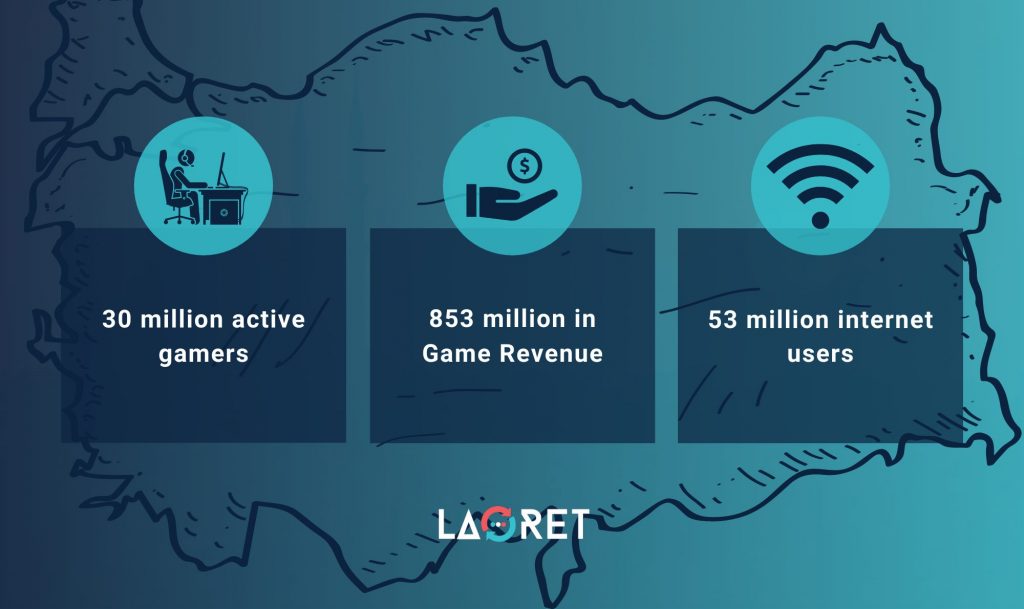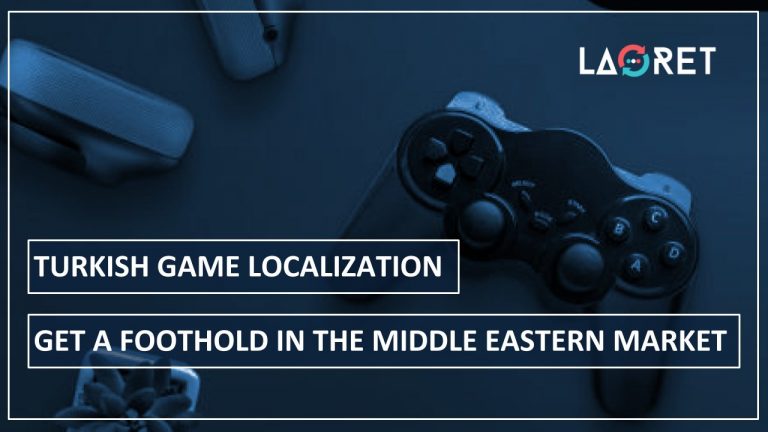Turkish Game Localization: Get A Foothold In The Middle Eastern Market
In our blog about the MENA Region (the Middle East and North Africa), we have expanded on the vast game localization opportunities this market has to offer. And now you may be asking yourself; how can I begin to take advantage of this highly diverse region? We recommend that you start with Turkish Game Localization.
The 30 million gaming community in Turkey has responded extremely positively to games effectively localized into the Turkish Language.4 And while this opens up a valuable opportunity for international brands to expand their products into foreign markets, this opportunity also comes with a set of rules. It is of vital importance that you understand the market you will be introducing your game to and that you find a language service provider with a deep understanding of the cultural, linguistic, and technical hurdles of localizing your game for the Turkish market.
Effective Turkish Game Localization: Who Is Your Audience?
The Turkish Gaming Market At A Glance
- The most popular type of game in Turkey, are the Puzzles (40 percent), Board Games (30 percent), and competitive gaming like Esports (19 percent).5
- 90 percent of the Turkish population owns a Smartphone while 86 percent owns a computer.
- While the other big player in the MENA Region, the Arabic Market, strongly favors mobile games, Turkeys gaming revenue shows a high interest in both Mobile and PC / Console games.
- The Turkish language poses a lot of unique linguistic challenges specific to the Gaming Industry.

Make A Genuine Connection With The Turkish Market
is a rather delicate process and the best linguists and engineers can find a balance between your game’s voice, and what your users are looking for. Localization is more than just translation and the words, as well as the images and cultural references, would need to be taken into account. But a trained Localization Team will also know what to touch, and what to leave as is.
For example, if a game features some references to Kungfu or other Asian martial arts, there is no need to transform every one of those to the Turkish martial art of Sayokan. Some games have a more international flair to them (which often adds to their charm!) and as long as the references aren’t too obscure and there are no cultural sensitivities breached, the characters can remain as they are.
However, it should be noted that any references to jokes related to specific TV-Shows, celebrities, or even current affairs, should have an appropriate and equally effective equivalent ready.
Speaking of celebrities, this can be a really big hit in Turkey! For example, when RIOT Games Localized global Super Star League of Legends into Turkish, they hired local celebrities as a voice-over talent. Now from the 100 million active players per month, Turkey can claim 15 million accounts as its own.
Keep Religious And Cultural Sensitivities In Mind
As a Muslim country, Turkey has different values than the Asian and Western cultures keen to introduce their games to the Turkish market. This is where a qualified multimedia localization team will definitely come in handy.
Understanding the Turkish culture will help you gain perspective into what type of games are welcome, and which not. For example, gambling is strictly regulated in Turkey, and any non-state, online gambling, has been banned since 2006. This means that online casino and table games are not welcome in Turkey. That being said, it is not always predictable which content will be rejected and banned.
Back in 2015, Minecraft was famously banned from Turkey. The Family and Social Policies Ministry had denounced the game as being too violent and possibly distilling violent thoughts into the minds of children. Because while the game centers around creative play through building houses and farms, it also involves killing in order to protect the construction.
So, it is always a good idea to review your in-game content in terms of texts as well as visuals and take note of anything that could be considered offensive to the Turkish population and, when in doubt, consult a qualified vendor with extensive experience localizing for the Turkish market.
English Proficiency In Turkey
According to data collected by the Education First English Language School in 2019, Turkey ranks among the countries with very low English proficiency, ranking at number 79 of the 100 countries listed.6 What’s more, for the last few years, Turkey’s English proficiency had been on a steady decline.
Turkey may lack a reliable structure to support effective language learning, but with the demand for entertainment and games increasing significantly, the localization market is uniquely positioned to fulfill a need. And the challenge lies in fulfilling this need with a service that answers both the cultural demands as mentioned above and the technical ones we will be looking at right now!
Unique Turkish Game Localization Challenges
The Turkish language possesses a number of linguistic qualities that make video game localization all the more challenging. This results in two major technical challenges that will require particular tools and expertise to prevent them from causing errors and undermine the UX.
Text Expansion
Turkish is a highly expressive language that is known for its agglutinative characteristics. In Turkish, a large variety of verbs are formed by a noun and an auxiliary verb, meaning many common video game commands will actually be formed by using two words rather than one.

As a general rule, you should allow between 22 and 33 percent of Text Expansion when translating from English to Turkish. This can be particularly challenging when dealing with the boxed texts, menus, table cells, and boxes, and can cause issues with overlapping texts, content overflowing from the provided space, and even lead to an incorrect running of the Operating System itself.
Pro Tip! Get a real insight into how Text Expansion errors can be prevented even from the game development phase in our blog on Managing Text Expansion For Software And Game Localization.
Suffixes And Regular Expressions
A common technical trick used by Localization Engineers to avoid coding errors and confusing translatable content, is to work with placeholders, or regular expressions. These make sure that certain content is locked and can’t be changed during the localization process.
Pro Tip! Discover the ins and outs of Regular Expressions as a tool to boost the translation process and prevent coding errors in our blog on How To Use Regular Expression To Identify Translatable Content.
These Regular Expressions are also used to lock certain player information such as in this game scenario: give sword to {player_name}. While this could be straightforward for English, Turkish relies very heavily on Suffixes that complicate the process. More specifically, this means that depending on the last syllable, suffixes are either conjugated as a front vowel or back vowel. As a result, the translation team will need to rely on custom translations rather than a one-size-fits-all solution.
The Importance Of Turkish Game Localization Quality Assurance (QA)
Games consist of multiple content layers covering in-game content, non-string content, the store content, voice-overs, and so on. In order to have a product optimized in a way that truly speaks to your audience, the game will be subjected to a rigorous QA process applied by in-country natives with extensive subject matter experience. This includes:
Linguistic QA:
- Perfecting grammar, spelling, numeric format checks, currency conversion, and consistency
- Reaching contextual accuracy by confirming the use of naturally flowing content with country-specific idioms and phrases.
- Confirming if cultural references are appropriate and which might be considered offensive, have effectively been weeded out.
Visual And User Experience QA:
- Resolving any UI or UX issues
- Being mindful of Text Expansion
- Graphics that are inappropriately positioned
- Sections that have been left untranslated
- Font issues
Functional &Technical QA:
- Testing the overall performance of the game
- Resolving any coding issues
- Be mindful of keyboard issues and misleading commands
- Resolve issues related to corrupted audio and missing text
Conclusion:
Turkish Game Localization can be a huge opportunity, but it needs to be done effectively. Your target locale needs to connect with your game and its characters, environment, and so on, in a genuine way. This involves linguistic, cultural, as well as technical considerations that all need to be applied accurately.
Laoret only employs native, in-country professionals experienced in the gaming industry. We select highly-trained linguists located in the region our clients are looking to target, and Localization Engineers who can resolve any possible technical issues and deliver a linguistically, culturally, and technically sound game ready for the Turkish market.
Read our blog on why you should localize your video game for the MENA-Region and discover what makes it the next best business opportunity.
If you are curious to find out what it would take to localize your game for the Arabic market, have a look at our blog expanding on the market, gaming behaviors, and localization challenges that define the Arabic gaming market.
- Games That Have Succeeded In Turkey Have All Been Localized
- Gaming Localization In Turkey
- Education First English Language School: English Proficiency
- Games That Have Succeeded In Turkey Have All Been Localized
- Gaming Localization In Turkey
- Education First English Language School: English Proficiency






